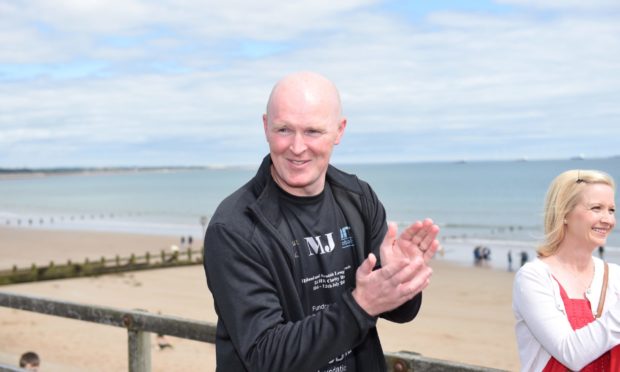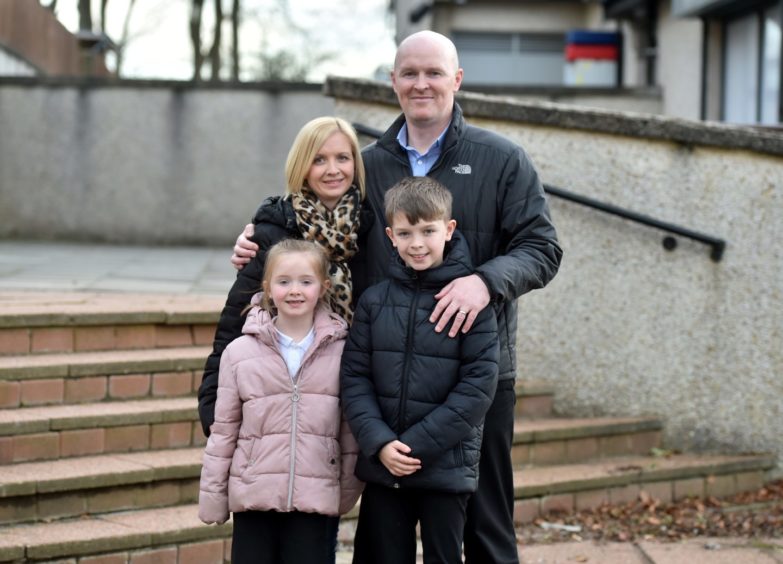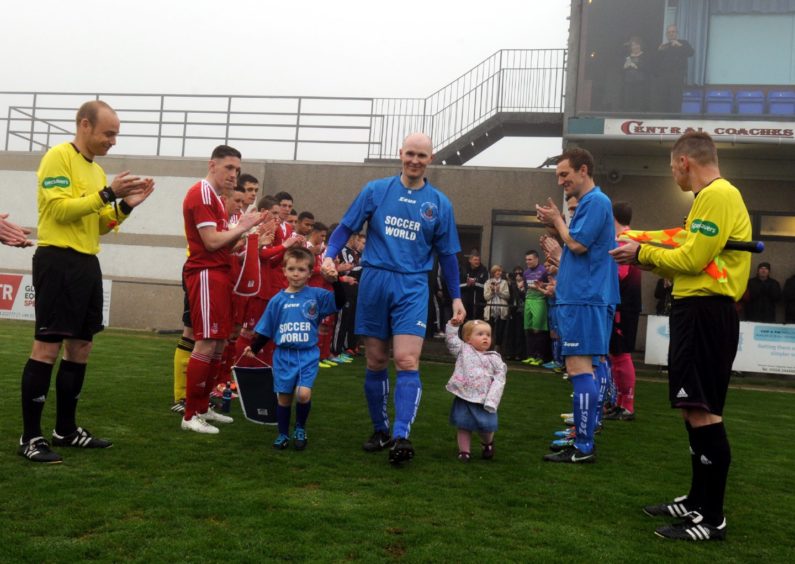As someone also living with Motor Neurone Disease, Martin Johnston watched the Rob Burrow documentary with intrigue and worry.
The 30-minute programme, aired last week on the BBC, is a hard watch. It shows how the Rugby League legend has been decimated by MND, with his wife Lindsey and immediate family now in the role of devoted full-time carers.
Burrow revealed in December 2019 he had the terminal illness, more than a year after former Cove Rangers, Peterhead and Elgin City footballer Johnston received his diagnosis.
The difference in their conditions is stark; where Burrow is wheelchair-bound and unable to speak without the use of a machine, Johnston is able to get about, communicate on his own and be the father and husband he wants to be.
But there are similar themes raised in the show which hit close to home. Johnston is also indebted to his wife, Jenny, for providing care both great and small to make his life easier and more enjoyable.
A positive outlook is omnipresent in both men, too, despite the challenges they face.
“I can relate to so much of it,” said Johnston, from his home in Kingswells. “He’s progressed a lot further, which is a shame.
“I heard Rob’s wife speaking about worrying about the future for their kids and that’s hard to watch. It’s the same fears I have for my family.
“Jenny has to help me with a lot of things. Some things round the house, but mainly when we go out – I use a rollator now to help me get about outside. I’m reasonably confident in the house, but outside is a different story.
“I’ve come to terms with it a lot better since the beginning. I didn’t think I’d ever get to the stage where I was enjoying life again, because I was devastated.
“Over time I’ve learned to deal with it. You can see it with Rob, too – he remains positive. That’s the only way to go about it and hope there’s some sort of treatment which comes along.”
‘I don’t think they expected me to still be doing what I’m doing’
Johnston was diagnosed with MND in August 2018, after a couple of years of noticing issues with his right leg. Among other early symptoms are slurred speech, difficulty swallowing, muscle cramps and twitches, and weight loss.
The disease attacks the brain and nerves and gradually worsens. Moving, swallowing and breathing become more difficult and it is ultimately fatal, although the timescales vary from person to person.
Johnston was given an initial prognosis of three years. The 44-year-old, who retired from football in 2014, has outlived that, heartened by the push for more treatment options or even a cure.
“Did I expect it to progress quicker? Definitely. When I spoke to the doctors and neurologists, they were quite blunt about it. I suppose they have to be.
“I don’t think they expected me to still be doing what I’m doing at this stage. The letters we got gave a prognosis of three years – I’ve not read them, but my wife did. That’s me over four years now.
“You read about people who survive 10 years-plus and are still going. I get it into my head that I’m going to be one of those people.
“Hopefully within that time, they’ll find some sort of treatment or cure.”
The help of others and waiting for the day a cure is found
The absence of treatment options for MND sufferers means each day without signs of the condition progressing have to be taken as small victories
Given the finality of the condition and the way it slowly erodes the ability to do even the most basic of tasks, it would be easy to be overwhelmed by a now-uncertain future.
Since we last spoke in 2020, Johnston’s condition has not deteriorated too significantly. He feels comfortable enough to walk around the house, but going outside requires the rollator.
Weakness in his hands means he cannot write clearly anymore. Lifting small items can be tricky and cutting up food can be difficult.
“I was at Alan Redford’s testimonial dinner the other weekend and was sat next to (Banks o’ Dee manager) Jamie Watt. He was helping me cut my food a little bit – you need to rely on people here and there to give you help.
“The majority of people say that (I look well).
“Whenever I meet somebody after a long time, they’ll say: ‘I didn’t know what to expect’. It’s good to hear; as a family, we see each other every day, so we don’t notice what’s happening too much.
“If you see somebody and they give a comment like that, it gives you a little boost.”
Family time ❤️🏴#grateful #makingmemories #prouddad #MND #ALS pic.twitter.com/XbA32JDQBO
— Martin Johnston (@MartinJ_MND) October 19, 2022
As highlighted by the Burrow documentary, children can have a remarkable capacity for compassion and understanding, even in the most daunting of situations. Calum and Sophie Johnston are no different.
“It’s a shame for them as they have to do more than they probably should for their age. But they just get on with it. Calum is a bit older now and he’s getting a bit stronger, so he helps a lot.
“I don’t want to impact their lives too much, at this age in particular. I try not to rely on them too much, but they are there if I need them.”
Johnston has been involved in drug trials in both Glasgow and Aberdeen and is awaiting the outcomes of both. Any further trials and research are going to be vital, until such point when a treatment can be found.
The awareness raised by Burrow and Doddie Weir, the former Scotland rugby international, has brought the issue of funding MND research to the top table. The UK Government has committed to allocating £50 million to the cause, on the back of campaigning from charities and MND sufferers.
Johnston said: “The more funding the charities get, the bigger the trials can become. More researchers can be employed. Things can be done quicker and it’s a race against time with a lot of it.
“Instead of treatments being available in decades, it could be available in years.
“That gives me so much hope, that they might have something to slow it down or stop it completely.”
His own fundraising efforts – and of those around him – have contributed in excess of £50,000 to MND charities and a race night at their local, the Fourmile, is planned for next year.
Football still a key part of Johnston life
Given the decorated career he had, it should come as no surprise that football continues to play a major role in family life.
Calum plays at Culter and Sophie at St Margaret’s, with the source of joy he experienced for so many years living on through his children.
“At first I was a bit afraid, as I wondered if football had caused this with me by heading the football. But as time goes on, I feel less and less like it was an overriding factor,” Johnston said.
“The kids love their football and I love watching them. It’s a hobby now. My wife has really got into it now as well.
“It’s a bit more difficult during the winter months, as the cold really affects my muscles. But it’s something we really enjoy and it takes your mind off the struggles elsewhere.
“I go to Cove now and then, I’ve been up to Peterhead and to Elgin.
“Ian Wilson, my former manager at Peterhead, has done a lot for me as well. He’s looked out for me from day one.
“The football people have played a big part and I’m really grateful for that.”



Conversation